Table of Contents
Ashwagandha is one of the most well-known plants in Ayurveda, and it has long been attributed to having a multitude of positive health effects. As time goes on, its potential benefits are increasingly being researched in scientific circles. So, what are the possible health effects of this plant, and which of them are supported by scientific evidence?
What is ashwagandha?
Ashwagandha (Latin: Withania somnifera) is also known as Indian ginseng, winter cherry, or poison gooseberry. The aroma of this plant is reminiscent of a horse’s smell, which is why it is often referred to as “The Smell of a Horse” in English. It is a shrub with yellow flowers and has long been considered one of the most important plants in the traditional Indian medicine system of Ayurveda.
The largest concentration of active compounds in ashwagandha is found in its root. That’s why dietary supplements often use extracts from this part of the plant. The root boasts over fifty known active compounds, including steroid lactones, also known as withanolides. These compounds are the main active ingredient found in this plant, and the root extract is typically standardized to contain a certain amount of them. [11]

What areas of health does ashwagandha impact, and what are its effects?
1. Stress and Anxiety Management
The primary and most researched benefit of ashwagandha is its impact on stress management. It ranks among adaptogens, which help the body restore its natural resistance to stress factors. These substances support the body’s internal defences against the effects of physical and psychological stressors through various mechanisms. The body can therefore more easily adapt to stress and pressure, thereby increasing its resilience. [14]
This is likely related to the impact of ashwagandha on mental health and its potential anxiolytic effects (anxiety-reducing effects) and antidepressant properties. As you may know, stress is commonly considered to be one of the triggers for anxiety and depression. [15,18]
The aforementioned effects are likely attributed to several mechanisms. Studies indicate that ashwagandha probably helps to reduce the levels of the hormone cortisol and other stress hormones by influencing the hypothalamic-pituitary system, which affects their production. The effects of ashwagandha may also be the results of its antioxidant and anti-inflammatory properties. Moreover, it is believed to have an impact on GABAergic receptors and serotonin activity, which have antidepressant and anxiolytic effects. The combination of all these mechanisms is likely responsible for its effects on stress and anxiety. [11,18]

Through the Lens of Science: The Effect of Ashwagandha on Anxiety
The effect of ashwagandha root extract on anxiety was investigated in a study involving 60 participants over a period of 60 days. The study monitored the participants’ levels of anxiety, stress, and certain hormone levels. Half of the participants, referred to as the experimental group, took 240 mg of ashwagandha, while the remaining participants, who comprised the control group, were administered a placebo.
The level of anxiety was measured using the HAM-A scale, which takes into account 14 different areas to assess the intensity of anxiety. During the 60-day study period, it was observed that the group taking ashwagandha experienced a significant and gradual reduction in anxiety compared to the placebo group. As a result, the anxiety level in the ashwagandha group was found to be up to 41% lower. [11]
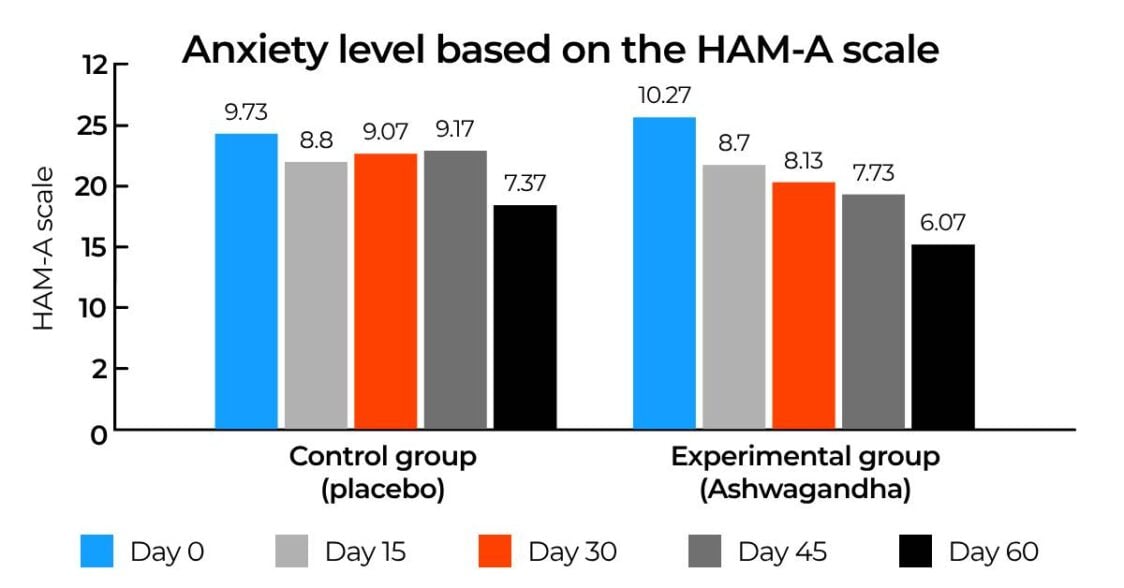
The effects of this plant on stress are likely the underlying reason for its other positive impacts. It has been widely recognized that chronic stress contributes to various health problems. By influencing stress levels, ashwagandha may positively affect other aspects of health, including immunity, the risk of metabolic disorders, cardiovascular issues, and obesity, among others. [16,22]
Areas of ashwagandha’s application studied for mental health:
- chronic stress
- states of anxiety
- depression
If you want to learn more about the impact of stress on health and how to mitigate it, check out our article: Why Is Stress Dangerous and How to Reduce It?
2. Nervous System and Cognitive Functions
The active ingredients found in ashwagandha root extract are also supposed to have potential effects on the brain and nervous system. This plant thus appears to have an impact on cognitive functions such as attention, memory, mental acuity, problem-solving skills, and planning. Therefore, it falls into the category of nootropics, which are substances that help support these brain functions. [13]
Some studies suggest that ashwagandha may support the brain’s dopaminergic system, potentially impacting memory. However, cognitive functions can also be influenced by factors like stress or anxiety, and it is likely that its effect on reducing stress plays a role here as well. [24]
In studies, these effects on cognitive functions have also been observed in people with neurodegenerative diseases such as Parkinson’s disease, Alzheimer’s disease, and other forms of dementia. Its antioxidant properties likely play a role in this, helping to combat free radicals that are also implicated in the development of Alzheimer’s disease. According to researchers, ashwagandha may also have an impact on reducing the loss of brain cells by acting on amyloid plaques, which are a characteristic component of this disease and play a key role in its progression. [8,13,20,24]
You might be interested in these products:
Through the Lens of Science: The Effect of Ashwagandha on Memory
The connection between ashwagandha and memory is one of the most frequently researched areas concerning the impact of this plant on health. A positive effect was observed, for instance, in a study that investigated the effect of its consumption on cognitive functions over a 90-day period with 130 participants.
The participants were divided into two groups, with the experimental group taking 300 mg of ashwagandha root extract daily, while the participants in the control group received a placebo. At the beginning and end of the study period, they underwent a series of memory tests (CANTAB), and the results were ultimately compared. The study revealed that while the placebo group experienced a slight decline in memory, the group taking ashwagandha showed significant improvement. [7]
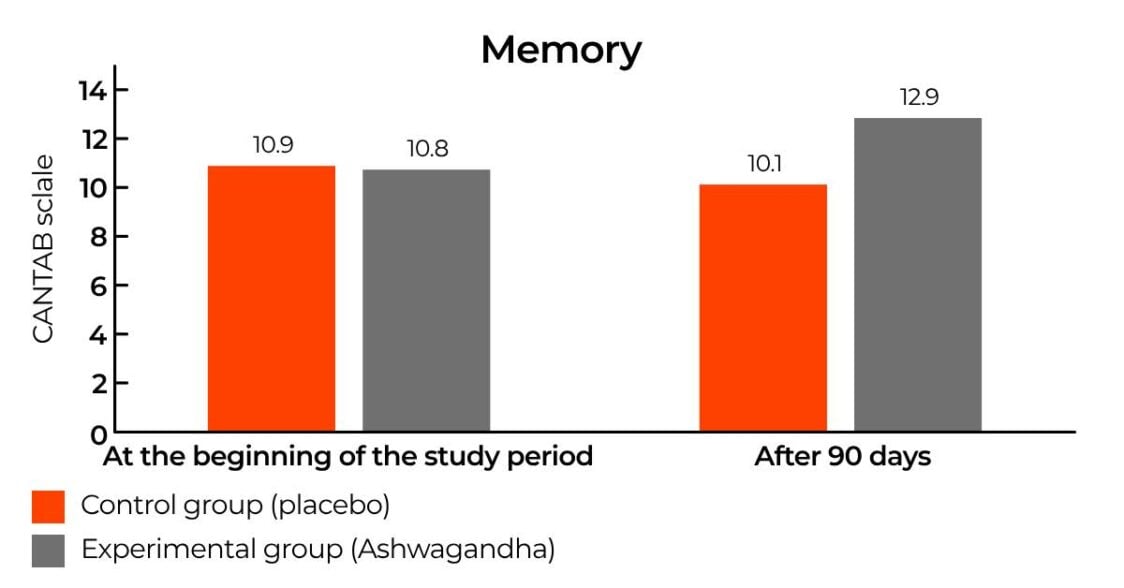
Areas of ashwagandha’s application studied for the nervous system and cognitive functions:
- memory
- attention
- mental acuity
- planning
- problem solving
- neurodegenerative diseases (Alzheimer’s disease, Parkinson’s disease)
If you want to learn how to effectively improve your concentration, read our article: How to Improve Concentration and Stay Focused at Work and While Studying?
3. Sleep
Another area where ashwagandha could potentially offer benefits is sleep, which is often neglected in today’s hectic age. This plant appears to have an impact on sleep duration, quality, and sleep onset latency. [23]
Several mechanisms are likely behind this effect. Ashwagandha probably influences sleep through GABAergic receptors, which are essential components of the sleep-wake cycle. Another substance that may play a role in this is ethylene glycol, which is naturally found in this plant and can induce drowsiness and fatigue. [23]

Through the Lens of Science: The Effect of Ashwagandha on Sleep
The effect of ashwagandha on sleep was demonstrated in a study that followed 58 individuals. They were divided into three groups, with one-third taking 250 mg of ashwagandha extract, another group receiving 600 mg of the extract, and the rest taking a placebo in the form of starch.
Participants assessed the quality of their sleep on a scale of 1 to 7, where the lowest value indicated the best sleep quality and the highest value represented poor sleep quality. After eight weeks, it was revealed that in the groups taking ashwagandha, the sleep quality had improved. The improvement was more significant in the group that consumed 600 mg of the extract compared to the group receiving a dose of 250 mg. [16]
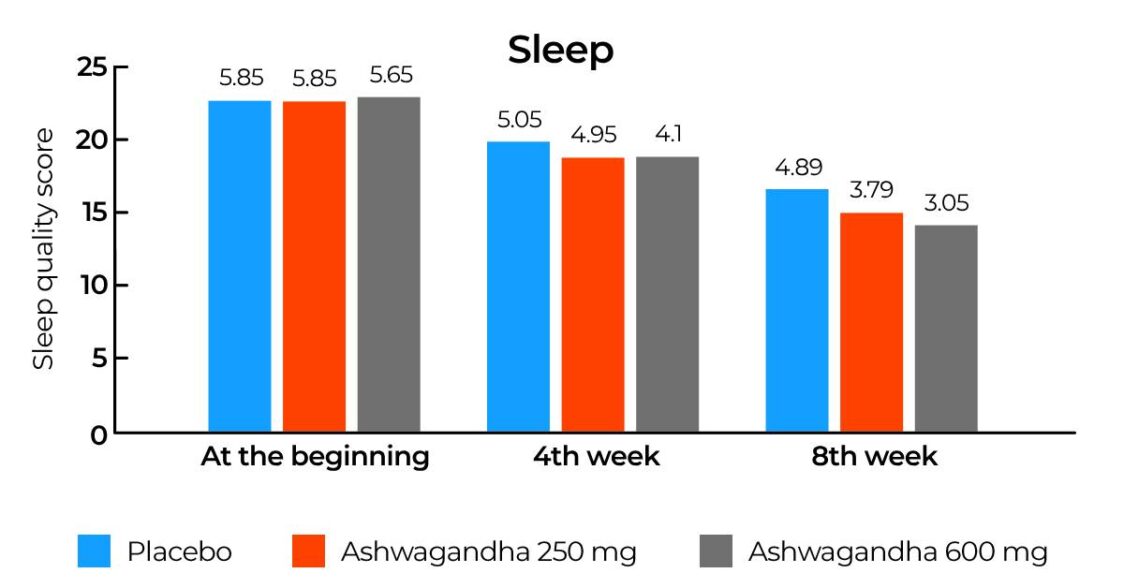
Areas of ashwagandha’s application studied for sleep:
- sleep quality
- sleep duration
- sleep onset latency
- mental alertness upon waking up
You can learn more about how to achieve a quality sleep in our article: How to Fall Asleep Quickly? Try These Simple Tips for a Better Sleep
4. Physical and Athletic Performance
Ashwagandha has shown potential positive effects on athletic performance, including muscle strength. The exact mechanisms by which ashwagandha influences physical performance are not fully understood, but it is likely related to its antioxidant properties. Antioxidants can help protect the body from oxidative stress, which may otherwise impair muscle recovery. According to some studies, ashwagandha supplementation may even delay muscle fatigue during prolonged activity, aid in muscle recovery, and prepare the muscles for subsequent training sessions. [5]
According to some studies, ashwagandha also contributes to an increase in hemoglobin levels (red blood pigment that binds oxygen) and other blood components. As a result, its consumption is likely to aid in more effective blood oxygenation, promoting endurance and performance during exercise.
This is also related to the potential effect of ashwagandha on increasing VO2 max, which represents the maximum amount of oxygen the body can utilize during physical exertion at a given moment. The higher this value, the better the physical condition. VO2 max is closely associated with endurance performance, and elite endurance athletes reach the highest values. [5,9]
The impact on strength enhancement could also be related to the influence of ashwagandha’s antioxidant properties on muscle mass. Improved muscle recovery and adaptability are closely associated with better performance and increased strength. [5]

Through the Lens of Science: The Effect of Ashwagandha on Leg Extension and Bench Press Strength
A positive effect on muscle strength was demonstrated in a study involving 50 men who underwent an 8-week training program. Half of the participants performed strength training while taking 300 mg of ashwagandha root extract. The other half trained similarly but received a placebo in the form of 300 mg of starch. The participants’ strength was measured by the weight lifted during bench press and leg extension exercises. Significant improvements were observed in both exercises for those participants who were taking ashwagandha. [19]

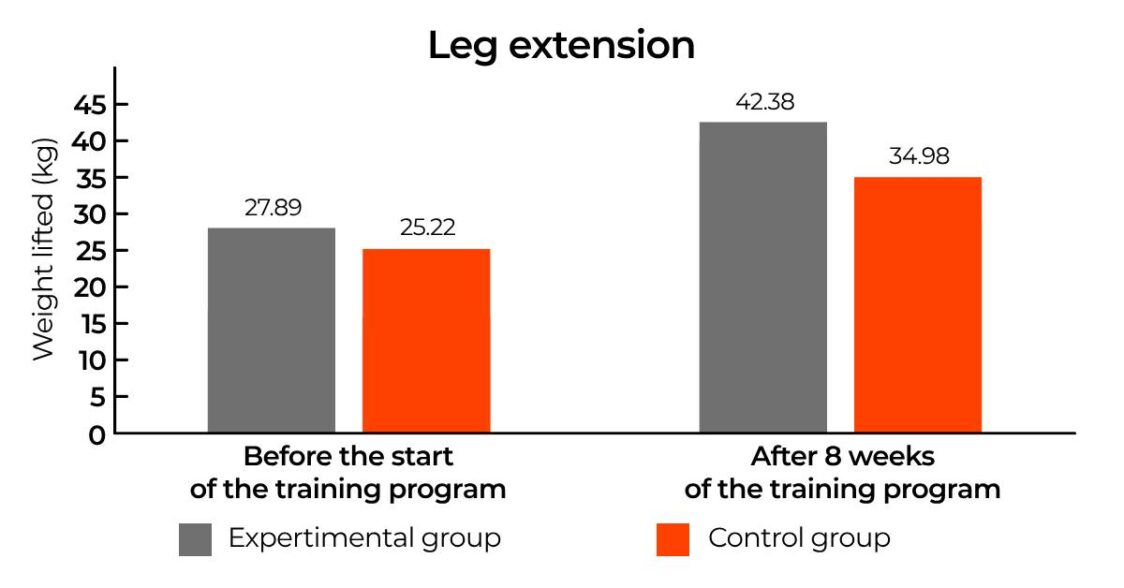
Areas of ashwagandha’s application studied for physical and athletic performance:
- muscle strength
- muscle recovery
- muscle fatigue
- endurance performance
- VO2 max
Behind every sports achievement lies a well-designed training plan. We will assist you in creating one in the article: How to Create a Quality Gym Training Plan?
5. Immune System
Today, we know that chronic stress can impair the immune system’s function, leading to reduced resistance against health issues. As ashwagandha appears to have a positive impact on stress reduction, it could also indirectly influence immune function in a positive way. Additionally, ashwagandha likely exhibits immunomodulatory effects, meaning it can potentially help to influence immune processes. [2,22]
Areas of ashwagandha’s application studied for the immune system:
- inflammation
- immunomodulatory effects
- concentration of immune cells
If you are looking to boost your immune system, be sure to check out our article: 15 Ways to Strengthen Your Immune System and Protect Health

6. Male Reproductive System and Testosterone Levels
Ashwagandha is also known for its effects on the male reproductive system. Research suggests that it may increase the levels of the male sex hormone testosterone and help establish optimal hormonal balance in the body. This, in turn, can likely support libido and overall sexual health. [12]
There are also studies that indicate its positive effect on increasing sperm concentration and improving sperm quality. It appears that this plant could support sperm production (spermatogenesis) while protecting them from oxidative stress at the same time. Protecting sperm from damage enhances their quality and thus overall male fertility. [12]
Through the Lens of Science: The Effect of Ashwagandha on Testosterone Levels
Scientists measured the testosterone levels of 50 volunteers who simultaneously underwent an 8-week training program. Half of them consumed 300 mg of ashwagandha extract, while the other half received a placebo in the form of starch. At the end of the study, those who took ashwagandha extract showed a significant increase in testosterone levels compared to the placebo group. [19]
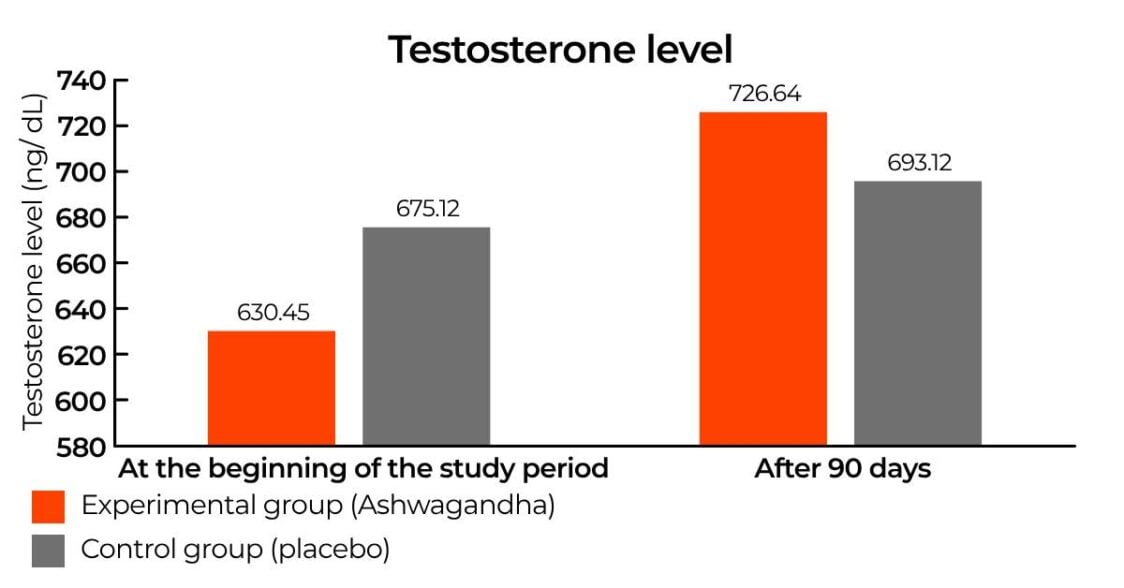
Through the Lens of Science: The Effect of Ashwagandha on Sperm Concentration
The link between ashwagandha supplementation and sperm concentration was quite evident in a study involving 50 men. Half of them received 675 mg of ashwagandha root extract daily for twelve weeks, while the other half took a placebo. Sperm concentration was measured three times in these men, and it was found that ashwagandha consumption led to a significant increase in sperm concentration, whereas the placebo group showed only minimal increase. [3]
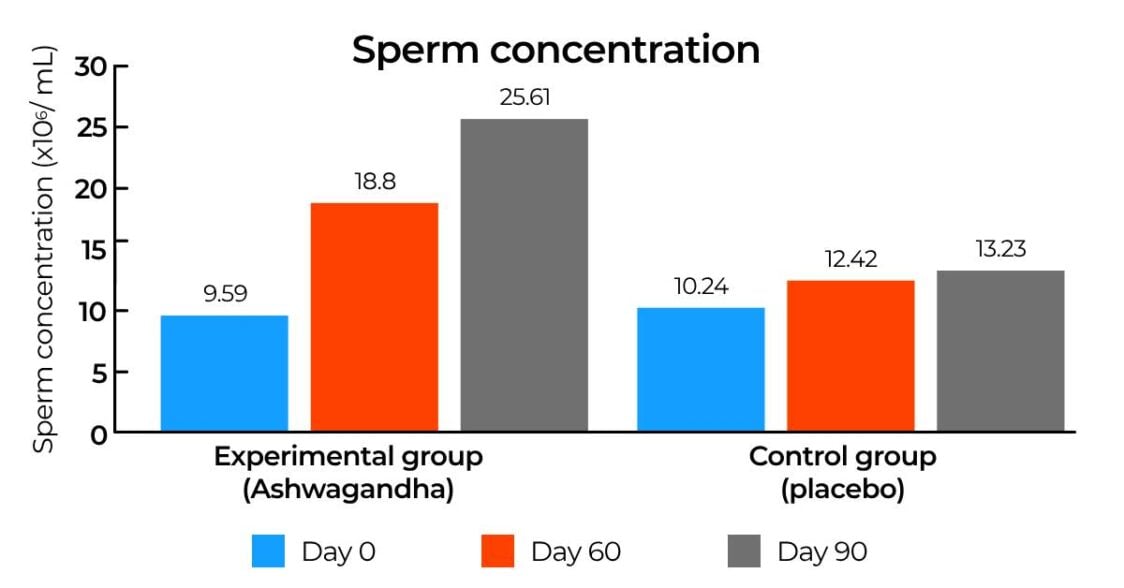
Areas of ashwagandha’s application studied for male health:
- testosterone levels
- optimal hormonal balance
- libido
- sexual health
- sperm quality (motility)
- sperm concentration
- fertility
For more information on optimal nutrition to support male health, read our article: Men & Nutrition: The Most Important Vitamins and Minerals for Health, Testosterone and Performance
7. Women’s Reproductive Health
Ashwagandha may potentially have an impact not only on male but also on female reproductive health. For instance, it has been shown to affect the levels of luteinizing and follicle-stimulating hormones, suggesting a potential influence on sexual health. Some studies have even indicated a possible effect in reducing sexual dysfunction. [1,6]
Areas of ashwagandha’s application studied for female health:
- optimal hormonal balance
- sexual health
- sexual dysfunction
For more detailed information on nutrient composition that can support women’s health, you can explore the article: Women & Nutrition: Essential Vitamins and Minerals for Health and Beauty

8. What other aspects of health can ashwagandha potentially affect?
Research mentions and explores many other potential health benefits of ashwagandha use. What are they?
- It appears that ashwagandha may help reduce blood sugar (glycaemia) and triglyceride levels in the blood (blood fats). [4]
- It is likely to help reduce inflammation and may be beneficial, for example, in conditions like arthritis (a chronic inflammatory autoimmune joint disease). [22]
- According to some studies, it may also help optimize thyroid hormone levels. [17]
Does ashwagandha aid in weight loss?
Nowadays, it is well-known that chronic stress is not only associated with health issues, but also with weight gain and even obesity. When we experience stress, the levels of the hormone cortisol rise, leading to more significant accumulation of body fat, particularly around the abdominal area. It is also common to experience stronger feelings of hunger and sweet cravings, which can result in higher caloric intake. [10]
The effect of ashwagandha use on reducing stress may also play a role in better appetite control and, consequently, weight management. Taking ashwagandha could be a helpful tool in weight loss by addressing hunger, reducing sweet cravings, and even preventing stress-related overeating. [10]
Before reaching for any dietary supplement, it’s essential to focus on your overall lifestyle. Our article “15 Tips on How to Lose Weight, Start Exercising and Eat Healthy” can provide you with valuable insights on how to achieve that.
How to use ashwagandha?
There is really no specific recommended intake for ashwagandha, as it varies based on individual needs. Studies have used doses ranging from 120 to 5000 mg of ashwagandha root extract, with the most common intake range being between 300 and 600 mg per day. This amount is typically divided into two daily doses, taken in the morning and evening, as this appears to be the most effective.
The effects of adaptogens are gradual, so it is important to take ashwagandha regularly and be patient when expecting results, as they may appear after several weeks. However, the long-term effects of ashwagandha use are not yet well-established. To ensure safety, it is advisable to use it for a maximum of three months and then take a break before resuming its use. [21,22]
Ashwagandha can be taken in various forms. The most common one is the form of practical capsules standardized to contain the active compounds, particularly withanolides. However, it is also available as tea or powder, which can be easily incorporated into meals. When purchasing this dietary supplement, you may come across the label “KSM-66,” indicating a higher content of not only withanolides, but also other active compounds. This is achieved by using a unique processing method. However, all variants contain a sufficient volume of both active ingredients and withanolides.

Can ashwagandha use have negative effects?
Ashwagandha contains various active compounds that can participate in metabolic processes and interact with each other. Additionally, some of these compounds have functions that are not fully understood, despite extensive research on this plant. Therefore, it may also have its unwanted effects, which should be taken into consideration when using it.
- During some studies, drowsiness or sedation (excessive calming of the body) has been reported as a side effect of ashwagandha use. [22]
- In rare cases, vomiting, flatulence, or other digestive issues may occur.
- Another possibility is the potential interaction with other active substances. It can, for example, interact with medications. Therefore, if you are taking any medications, it is advisable to consult a doctor about the use of this dietary supplement.
- Due to its potential effects on blood sugar levels, the immune system, and even sleep, there is a chance that ashwagandha could likely interact with medications that target these specific areas of health. [21]
- Last but not least, taking this plant is not recommended during pregnancy or while breastfeeding. This is due to the fact that there is insufficient evidence regarding its safety during these stages of life.
What are the main takeaways?
Ashwagandha has been a well-known plant in Ayurvedic practices for a long time, owing to its promising health benefits. Recently, scientists have taken a keen interest in its properties, and many of its effects are now supported by scientific evidence. Today, we know that ashwagandha root extract likely plays a role in reducing stress and anxiety, supporting cognitive functions, and improving athletic performance and muscle strength. Additionally, it appears to aid in promoting better sleep, increasing testosterone levels, and boosting the function of the immune system. With its diverse range of health benefits, ashwagandha has emerged as a versatile plant-based supplement that may be able to help enhance overall health and fortify the body’s resilience.
Have you learned something new or interesting from this article? If so, don’t keep it just to yourself, but share it with your friends to spread the knowledge.
[1] AJGAONKAR, A. et al. Efficacy and Safety of Ashwagandha (Withania somnifera) Root Extract for Improvement of Sexual Health in Healthy Women: A Prospective, Randomized, Placebo-Controlled Study. – https://www.ncbi.nlm.nih.gov/pmc/articles/PMC9701317/
[2] ALANAZI, H.H. - ELFAKI, E. The immunomodulatory role of withania somnifera (L.) dunal in inflammatory diseases. – https://www.ncbi.nlm.nih.gov/pmc/articles/PMC9992553/
[3] AMBIYE, V.R. et al. Clinical Evaluation of the Spermatogenic Activity of the Root Extract of Ashwagandha (Withania somnifera) in Oligospermic Males: A Pilot Study. – https://www.ncbi.nlm.nih.gov/pmc/articles/PMC3863556/.
[4] ANDALLU, B. - RADHIKA, B. Hypoglycemic, diuretic and hypocholesterolemic effect of winter cherry (Withania somnifera, Dunal) root. – https://pubmed.ncbi.nlm.nih.gov/11116534/
[5] BONILLA, D.A. et al. Effects of Ashwagandha (Withania somnifera) on Physical Performance: Systematic Review and Bayesian Meta-Analysis. – https://www.ncbi.nlm.nih.gov/pmc/articles/PMC8006238/
[6] DONGRE, S. et al. Efficacy and Safety of Ashwagandha (Withania somnifera) Root Extract in Improving Sexual Function in Women: A Pilot Study. – https://www.ncbi.nlm.nih.gov/pmc/articles/PMC4609357/
[7] GOPUKUMAR, K. et al. Efficacy and Safety of Ashwagandha Root Extract on Cognitive Functions in Healthy, Stressed Adults: A Randomized, Double-Blind, Placebo-Controlled Study. – https://pubmed.ncbi.nlm.nih.gov/34858513/
[8] GREGORY, J. et al. Neuroprotective Herbs for the Management of Alzheimer’s Disease. – https://www.ncbi.nlm.nih.gov/pmc/articles/PMC8068256/
[9] CHOUDHARY, B. et al. Efficacy of Ashwagandha (Withania somnifera – L.] Dunal) in improving cardiorespiratory endurance in healthy athletic adults. [https://www.ncbi.nlm.nih.gov/pmc/articles/PMC4687242/
[10] CHOUDHARY, D. et al. Body Weight Management in Adults Under Chronic Stress Through Treatment With Ashwagandha Root Extract: A Double-Blind, Randomized, Placebo-Controlled Trial. – https://pubmed.ncbi.nlm.nih.gov/27055824/
[11] LOPRESTI, A.L. et al. An investigation into the stress-relieving and pharmacological actions of an ashwagandha (Withania somnifera) extract: A randomized, double-blind, placebo-controlled study. – https://www.ncbi.nlm.nih.gov/pmc/articles/PMC6750292/
[12] NASIMI DOOST AZGOMI, R. et al. Effects of Withania somnifera on Reproductive System: A Systematic Review of the Available Evidence. – https://www.ncbi.nlm.nih.gov/pmc/articles/PMC5833251/
[13] NG, Q.X. et al. A systematic review of the clinical use of Withania somnifera (Ashwagandha) to ameliorate cognitive dysfunction. – https://pubmed.ncbi.nlm.nih.gov/31742775/
[14] PANOSSIAN, A. Understanding adaptogenic activity: specificity of the pharmacological action of adaptogens and other phytochemicals. – https://onlinelibrary.wiley.com/doi/abs/10.1111/nyas.13399
[15] PRATTE, M.A. et al. An Alternative Treatment for Anxiety: A Systematic Review of Human Trial Results Reported for the Ayurvedic Herb Ashwagandha (Withania somnifera). – https://www.ncbi.nlm.nih.gov/pmc/articles/PMC4270108/
[16] SALVE, J. et al. Adaptogenic and Anxiolytic Effects of Ashwagandha Root Extract in Healthy Adults: A Double-blind, Randomized, Placebo-controlled Clinical Study. – https://www.ncbi.nlm.nih.gov/pmc/articles/PMC6979308/
[17] SHARMA, A.K. et al. Efficacy and Safety of Ashwagandha Root Extract in Subclinical Hypothyroid Patients: A Double-Blind, Randomized Placebo-Controlled Trial. – https://pubmed.ncbi.nlm.nih.gov/28829155/
[18] SPEERS, A.B. et al. Effects of Withania somnifera (Ashwagandha) on Stress and the Stress- Related Neuropsychiatric Disorders Anxiety, Depression, and Insomnia.– https://pubmed.ncbi.nlm.nih.gov/34254920/
[19] WANKHEDE, S. et al. Examining the effect of Withania somnifera supplementation on muscle strength and recovery: a randomized controlled trial. – https://www.ncbi.nlm.nih.gov/pmc/articles/PMC4658772/
[20] ZAHIRUDDIN, S. et al. Ashwagandha in brain disorders: A review of recent developments. – https://pubmed.ncbi.nlm.nih.gov/32305638/
[21] Ashwagandha - Special Subjects. – https://www.msdmanuals.com/home/special-subjects/dietary-supplements-and-vitamins/ashwagandha?query=ashwagandha
[22] Ashwagandha health benefits, dosage, safety, side effects, and supporting evidence. | Supplements | Examine. – https://examine.com/supplements/ashwagandha/
[23] Can Ashwagandha Help You Sleep? – https://www.sleepfoundation.org/sleep-aids/ashwagandha
[24] Efficacy and Safety of Ashwagandha (Withania somnifera (L.) Dunal) Root Extract in Improving Memory and Cognitive Functions – https://pubmed.ncbi.nlm.nih.gov/28471731/


Add a comment